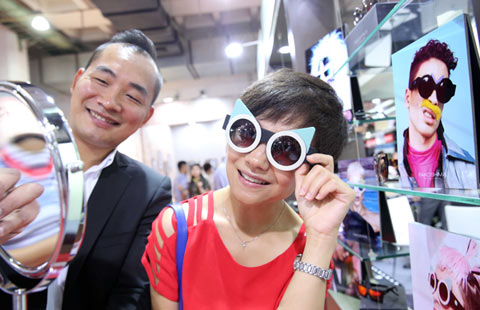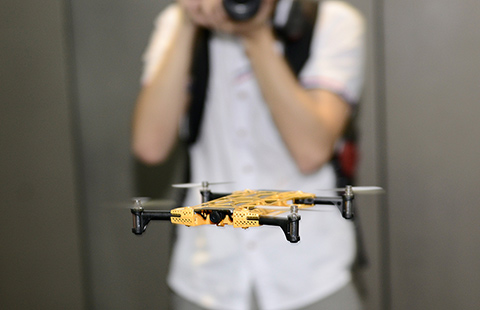HiScene aims HiAR in fight with Microsoft glasses
By MA SI (China Daily) Updated: 2016-08-17 09:44In the age of augmented reality or AR, glasses are not just a means to a better vision. They can pack in functions like computing, real-time location-detection, and depth measurement. They can even enable you to play with digital robots in physical environments.
All that is made possible by HiScene Information Technology Co Ltd, a four-year-old startup in Shanghai. It has unveiled an AR-enabled gadget brand called HiAR Glasses in a bid to take on global tech giant Microsoft Corp, which has launched smart glasses called Hololens.
HiAR Glasses has a string of cameras and sensors that can track a user's movement and create three-dimensional models of spaces. Equipped with telecommunication modules, it also supports voice calls.
Liao Chunyuan, CEO of HiScene, said: "unlike most domestic smart glasses which only have one screen, HiAR Glasses comes with two separate but synchronized OLED screens, which can project a better digital world."
Liao, a former Silicon Valley-based researcher of Fuji Xerox Co Ltd, has years of experience in research and development of image recognition and human-device interactions, an advanced science that has been applied in HiAR Glasses.
"HiAR Glasses can respond to gesture controls," Liao said, adding HiScene Information Technology will launch the second-generation smart glasses later this year.
According to him, one of the most difficult challenges in making AR glasses is the task of finding a set of algorithms that can help nail down the location of users and objects in real time.
For example, when AR glasses enable a user to see an image of an emperor as if sitting on a real-life chair in the user's living room, the glasses need to recognize both the user's and the chair's location, so that the virtual emperor's gait appears just right and real life-like. The company has been working hard to optimize its algorithms, he said.
Last year, HiScene Information Technology received an undisclosed amount of funding from venture capital firm GGV Capital, which is an early-stage investor in Chinese internet and tech giants such as Alibaba Group Holding Ltd and Xiaomi Corp.
Zhao Ziming, an analyst at Beijing-based internet consultancy Analysys, said AR glasses could have applications in education, gaming and tourism industries.
But the technology is still in its infancy and will need several years before it can be widely used in enterprise markets. Consumers will be slower in accessing the cutting-edge technology, he said.
- Praxair 'held' merger talks with Linde
- Gogo in-flight Wi-Fi service ready for takeoff on China flights
- Shenzhen and HK bourse link approved
- Sunny Chinese have an eye for fashion
- Innovation drive beefs up nation's global ranking
- Vanke surges once more as Evergrande increases stake
- China makes progress on annual urbanization goals
- China to intensify efforts to stabilize foreign trade


















